Related Research Articles

A berry is a small, pulpy, and often edible fruit. Typically, berries are juicy, rounded, brightly colored, sweet, sour or tart, and do not have a stone or pit, although many pips or seeds may be present. Common examples of berries in the culinary sense are strawberries, raspberries, blueberries, blackberries, red currants, white currants and blackcurrants. In Britain, soft fruit is a horticultural term for such fruits.

Amelanchier alnifolia, the saskatoon berry, Pacific serviceberry, western serviceberry, western shadbush, or western juneberry, is a shrub with an edible berry-like fruit, native to North America.

Chellie MariePingree is an American politician serving as the U.S. representative for Maine's 1st congressional district since 2009. Her district includes most of the southern part of the state, including Portland and Augusta.

Bartles & Jaymes is a flavored wine cooler and malt beverage line produced by the E & J Gallo Winery in the United States, introduced in 1985, and available in various fruit flavors.

Jewell Towne Vineyards is a winery in the state of New Hampshire. The property is located on the hills overlooking the Powwow River a few miles from the Atlantic Ocean. The property is the oldest currently producing winery in New Hampshire, and is seen as a leader in establishing northern New England cold hardy cultivars.
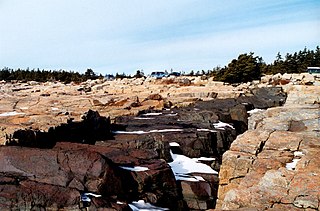
The Schoodic Peninsula is a peninsula in Down East Maine. It is located four miles (6 km) east of Bar Harbor, Maine, as the crow flies. The Schoodic Peninsula contains 2,266 acres (9 km2), or approximately 5% of Acadia National Park. It includes the towns of Gouldsboro and Winter Harbor. The peninsula has a rocky granite shoreline containing many volcanic dikes. The peninsula is home to the former United States Navy base, NSGA Winter Harbor, which has been converted into a National Park Service training center. A 3,300-acre (13 km2) resort development was proposed for land abutting Schoodic Peninsula's national park holdings to the north. An anonymous donor eventually bought the entire 3,200-acre tract and built the Schoodic Woods Campground and miles of gravel bike paths before donating all of it to Acadia National Park. Opening in 2015, Schoodic Woods is the newest campground in Acadia National Park, and the first built in the park since the original campgrounds were built by the Civilian Conservation Corps during the Great Depression beginning in 1936. In the summer, the Schoodic peninsula is currently served by two separate ferry services from Bar Harbor to Winter Harbor that run daily.

Vaccinium angustifolium, commonly known as the wild lowbush blueberry, is a species of blueberry native to eastern and central Canada and the northeastern United States, growing as far south as the Great Smoky Mountains and west to the Great Lakes region. Vaccinium angustifolium is the most common species of the commercially used wild blueberries and is considered the "low sweet" berry.

Ontario wine is Canadian wine produced in the province of Ontario. The province has three official wine-growing regions, the Niagara Peninsula, the north shore of Lake Erie, and Prince Edward County, although wineries also exist in other regions in Ontario. Approximately two-thirds of Canada's vineyard acreage is situated in Ontario, with over 150 vineyards spread across 6,900 hectares. As a result, the province is the country's largest producer of wine, accounting for 62 per cent of Canadian wine production, and 68 per cent of all Canadian wine exports.

Maine wine is made from fruit grown in the U.S. state of Maine. Most is made from fruit other than grapes, including apple, cranberry, and blueberry wines. A few wineries in Maine produce limited quantities of wine made from locally grown French hybrid grape varieties. Maine's climate is too cold for viticulture. The first winery in Maine, Bartlett Maine Estate Winery, was established in 1983.
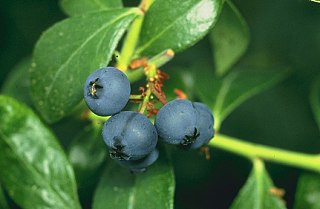
Blueberries are a widely distributed and widespread group of perennial flowering plants with blue or purple berries. They are classified in the section Cyanococcus within the genus Vaccinium. Vaccinium also includes cranberries, bilberries, huckleberries and Madeira blueberries. Commercial blueberries—both wild (lowbush) and cultivated (highbush)—are all native to North America. The highbush varieties were introduced into Europe during the 1930s.

Alaska wine refers to wine made in the state of Alaska. Alaskan wineries import juice from out of state to make Merlot, Chardonnay, Cabernet Sauvignon, Pinot Noir and Riesling. Some wineries produce wine made with fruits other than grapes. Alaska's signature wines are made from honey and native Alaskan fruit such as raspberry, blueberry, strawberry, salmonberry, gooseberry and rhubarb. Some wineries also produce ice wine. There are no designated American Viticultural Areas in the state.

Westfall Winery was a winery in Montague Township in Sussex County, New Jersey. Formerly a stop on the Underground Railroad and a dairy farm, the vineyard was first planted in 2000, and opened to the public in 2003. Westfall had 6 acres of grapes under cultivation, and produced 9,000 cases of wine per year, mostly from imported grapes. The winery was named for the family that owned the farm from 1774 to 1940. It was sold in December 2017 and became an animal sanctuary.
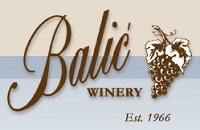
Balic Winery is a winery in the Mays Landing section of Hamilton Township in Atlantic County, New Jersey. The vineyard was first planted in the early 19th century by descendants of the original settlers of Mays Landing. Balic is the third-oldest active winery in the state, after Renault Winery and Tomasello Winery, having opened in 1966. Balic is one of the largest winegrowers in New Jersey, having 57 acres of grapes under cultivation. The winery is named after its founder.
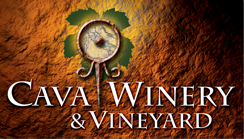
Cava Winery & Vineyard is a winery in Hardyston Township in Sussex County, New Jersey. The vineyard was first planted in 2005, and opened to the public in 2008. Cava has 5 acres of grapes under cultivation, and produces 3000 cases of wine per year. The winery is named for the Italian word cava which means "cave," reflecting the mining heritage of Sussex County.

Coda Rossa Winery is a winery in the Franklinville section of Franklin Township in Gloucester County, New Jersey, United States. The vineyard was first planted in 2002. The current owners obtained the property and winery in 2021, and previously Coda Rossa opened to the public in 2010. Coda Rossa has 10 acres of grapes under cultivation, and produces 1,500 cases of wine per year. The winery is named for the Italian words coda rossa which mean "red tail," because of the red-tailed hawks that live near the farm.
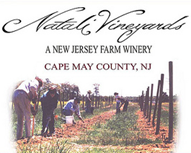
Natali Vineyards is a winery in the Goshen section of Middle Township in Cape May County, New Jersey, USA. Formerly a pasture for horses, the vineyard was first planted in 2001, and opened to the public in 2007. Natali has seven acres of grapes under cultivation, and produces 1,800 cases of wine per year. The winery is named after the vintner and co-owner of the winery.
William Heritage Winery is a winery in the Mullica Hill section of Harrison Township in Gloucester County, New Jersey. A family produce farm since 1853, the vineyard was first planted in 1998, and opened to the public in 2002. Heritage is one of the larger winegrowers in New Jersey, having 40 acres of grapes under cultivation, and producing 13,000 cases of wine per year. The winery is named after the family that owns it.

Valenzano Winery is a winery in Shamong in Burlington County, New Jersey, United States. A family grain and livestock farm since 1974, the vineyard was first planted in 1991, and opened to the public in 1996. Valenzano is one of the largest wine producers in New Jersey, having 88 acres of grapes under cultivation, and producing 80,000 cases of wine per year. The winery is named after the family that owns it.
Karen Heck is an American community activist, women's rights activist, non-profit administrator, and politician. She was Mayor of Waterville, Maine from 2012 to 2014. She was inducted into the Maine Women's Hall of Fame in 2008.
References
- ↑ "Wineries". Maine Wine Trail. Retrieved 20 May 2019.
- ↑ Cattell, Hudson (2013), "Maine", Wines of Eastern North America, Cornell University Press, p. 350, ISBN 9780801468995
- 1 2 Schipani, Sam (2020-03-10). "Fruit wine may make Maine the next Napa Valley". Bangor Daily News. Retrieved 2023-04-07.
- ↑ Tree, Christina; English, Nancy (2012-06-04). Explorer's Guide Maine (Sixteenth Edition) (Explorer's Complete). The Countryman Press. p. 58. ISBN 978-0-88150-964-9.
- ↑ Schipani, Sam (2020-08-31). "How wild blueberry wine could save Maine's iconic, struggling agricultural product". Bangor Daily News. Retrieved 2023-04-07.
- ↑ Ricchio, Joe (2018-11-21). "3 Maine Wines for Your Holiday Table". Down East Magazine. Retrieved 2023-04-07.